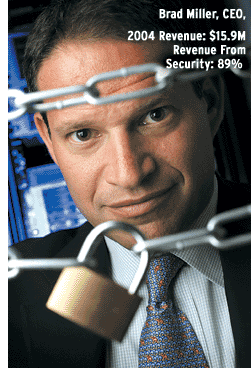Perimeter Internetworking
Once a bank installs security equipment, regulations kick in that require daily log monitoring, among other staff-intensive tasks. By removing the firewall and other security products from the premises, the bankers are able to offload the compliance issues to Perimeter and focus on their core business, Runyon said. "Bankers want to be bankers," he said. "They don’t want to be technology experts."

For managed security services provider Perimeter Internetworking, racking up 61 percent revenue growth from 2003 to 2004 was old hat.
The company has been in fast-growth mode since its founding in 1999, growing 1,900 percent in its first five years.
The key to such a meteoric rise, says CEO Brad Miller, is the Milford, Conn., company’s approach to managing security, which Miller calls "security on demand." Perimeter eschews the traditional remote management of customer premise equipment. Instead, customers’ routers connect directly to Perimeter’s infrastructure, which then connects to the Internet. No Internet traffic that leaves or comes into a customer’s network bypasses Perimeter’s security infrastructure.

Perimeter’s basic package includes firewall, intrusion-detection and intrusion-prevention services. Customers can add e-mail antivirus, spam filtering, content filtering and a host of other services at any time without any interruption in traffic, Miller said. And they do. More than 50 percent of Perimeter’s growth comes from existing customers adding new services, he said.
Perimeter sells to a number of verticals, including financial, health care, ISPs and nonprofits. The MSSP also offers a channel program to other solution providers that want to resell its services.
| AD | |
|---|---|
| id | unit-1659132512259 |
| type | Sponsored post |
Perimeter’s offerings have been particularly attractive to community banks, says Kevin Runyon, COO of United Computer Sales and Service, a Cherry Hill, N.J., solution provider that has resold Perimeter’s services to more than 25 banks. A robbery at a branch could cost a bank $15,000 or $20,000, but a hacker who gets away with customer data could cost the bank millions of dollars, Runyon said.
While United Computer Sales gets recurring monthly revenue from its Perimeter services customers, the company could make a lot more money selling and installing security solutions at the banks, Runyon said. "We don’t make as much, but I’m convinced this is the right solution for banks," he said.